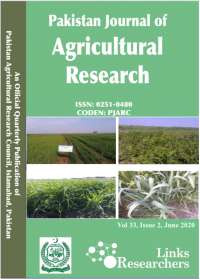Hydroponic Tomato Production and Productivity Improvement in Pakistan
Hydroponic Tomato Production and Productivity Improvement in Pakistan
Arshad Mahmood Malik1, Khalid Mahmood Mughal2, Sarfraz Ahmed Mian2 and Atta Ullah Khan2
ABSTRACT
Hydroponics production system is state of the art technology, ensuring round the year high quality vegetables free from any residual effects and multiple time productivity in specially developed glasshouses under controlled weather conditions during summer and winter. Rising population and stagnancy both in yield of vegetables and cultivated area of the country, are negatively affecting food supply in Pakistan. Supply of hydroponics products provides solution to the problem of decade old stagnancy in yield of the vegetables especially tomato to cater the increasing demand due to gigantic population increase. This study has been designed to analyze the hydroponics production system and productivity improvement option in Pakistan and its future prospects. Study is based on primary data collected by the researcher. Sample firm was Farmers Market Pvt. Ltd which is unique entity involved in commercial production of hydroponic products in Pakistan. Data on various production and economic variables was collected from FMP during 2009 to 2013. Variable of the study were area, area allocation decisions of farmer, customer structure, markets, costs involved in production process and revenue earned from selling of the produce in both local and in export market. Yield of hydroponic tomatoes was measured in hectares. Benefit cost ratio was studied and other measures of performance like export intensity, local penetration ratio etc. were also analyzed. Average yield of hydroponic tomatoes was found to be 161.8±6.6 ton per hectare as against 10.07±0.4 in open field. The BCR was found positive at 1.07 and 1.44 for with and without casual labor respectively. Analysis suggests that this technology can improve the yield of tomato in the country and solve the demand and supply gap of Pakistan besides helping in export promotion and import substitution. Various factors identified in analysis have been further examined and measures have been suggested to improve supply of tomato in Pakistan.
To share on other social networks, click on any share button. What are these?







